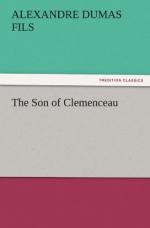The girl intimated that the mysterious entrance portended secrecy to be preserved. And, again, the lady had come without baggage, even so much as in eloping from home. But Madame Clemenceau explained, with the most natural air in the world, that she had walked over from the railway station, where her impedimenta remained.
“Walked half a mile?” ejaculated Hedwig, who knew that the speaker had been vigorous enough at Munich, but, since her marriage, and living at Montmorency, she had assumed the popular air of a semi-invalid, “So you are strong in health again?”
“Yes; but I have been very unwell,” replied the lady, sinking back in the chair as she remembered the course she had intended to adopt. “I was very nearly at death’s door,” she sighed. “I really believed that I should nevermore see any of you, my poor husband and you others. Do you think that anything hut a severe ailment could excuse me for my strange silence—my apparently wicked absence?”
Hedwig went on going through the form of dusting the huge metal-bound chest, which had attracted the mistress’ eyes as a new article of furniture. Had her husband turned miser since Fortune had whirled on her wheel at his door as soon as she quitted it? It was not Hedwig’s place, and it was not in her power to solve enigmas, so she answered nothing.
“My uncle was terribly afflicted,” said the lady.
“Your uncle?”
Hedwig’s incredulous tone implied that she had not believed in the authenticity of the telegram.
“Yes; my granduncle. He was within an ace of dying, and the shock made me so bad, after nursing him toward recovery, it was I who stood in peril of death. My friends sent for a priest and I confessed.”
The girl opened her eyes in wonder and a kind of derision, for she did not belong to the aristocratic creed.
“Confessed?” reiterated she; “ah, yes; people confess when they are very bad. Was it a complete confession, madame?” she saucily inquired.
“Complete as all believers should make when on the brink of the grave,” replied Madame Clemenceau, in her gravest tone to repress the tendency to frivolity, for she had not resented the incredulity as regarded herself.
“I dare say,” said Hedwig, who certainly had one of her lucid intervals, “it is as when a body is traveling, one is in such a hurry that something is forgotten. You went away so sharply that you forgot to say good-bye to the master! if you spoke at all! Whatever did the father-confessor say?”
“He gave me very good advice.”
“Which you are following, madame?”
“When one not only has seen death smite another beside one but flit close by oneself, I assure you, girl, it forces one to reflect. Oh, how dreadful the nights are in the sick chamber, with a night-light dimly burning and the sufferer moaning and tossing! Then my turn came to occupy the patient’s position, and it was frightful. Can you not see I am much altered—horrid, in fact?”




